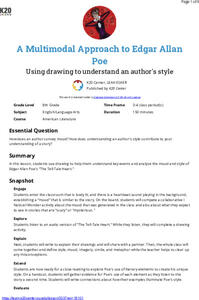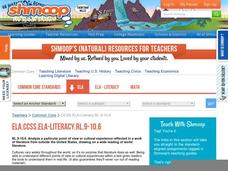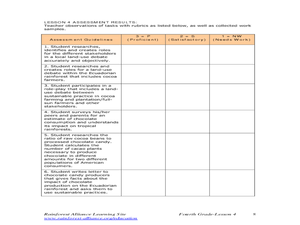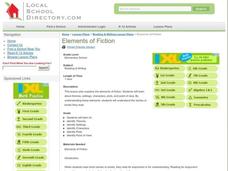K20 LEARN
A Multimodal Approach To Edgar Allan Poe Using Drawing To Understand An Author's Style
True! Poe's "The Tell-Tale Heart" makes readers nervous. But how? Young scholars create a drawing while listening to a reading of Poe's eerie tale to understand how writers create the mood of their stories and what their writing style...
K20 LEARN
Criminal Motivations: Irony and Characterization In "The Cask Of Amontillado"
Edgar Allan Poe's short story "The Cask of Amontillado" is a bit of a puzzle. Critics have long debated Montresor's motives for killing Fortunato. Young scholars examine examples of the three types of irony (verbal, dramatic, and...
Shmoop
ELA.CCSS.ELA-Literacy.RL.9-10.6
Being able to identify and understand the point of view of fictional characters across a wide range of time periods, places, and cultures is a skill that is necessary for becoming a proficient reader. It is also a skill identified in the...
Curated OER
A Modest Proposal: Irony Made Understandable with Rock and Roll
Who doesn't love music? Poems and songs will engage your high school class in a discussion about irony. Use songs like "Rockin' in the Free World" or "Born in the U.S.A." to illustrate the ironic point of view. Print the lyrics so...
K20 LEARN
The New Colossus: Determining Author's Perspective
Introduce young scholars to the concept of the author's perspective with a lesson that uses Emma Lazarus's poem, "The New Colossus," as the anchor text. Groups use a T-chart to identify words that reveal the author's point of view of The...
Curated OER
Writing Sentences Lesson Plan
Students explore first person and third person points of view. For this perspective lesson, students identify first person and third person points of view in literature they have read. Students rewrite stories from different perspectives.
MENSA Education & Research Foundation
Magical Musical Tour: Using Lyrics to Teach Literary Elements
Language arts learners don't need a lecture about poetry; they listen to poetry every day on the radio! Apply skills from literary analysis to famous songs and beautiful lyrics with a instructional activity about literary devices. As...
EngageNY
Mid-Unit Assessment and Discussing Themes in Esperanza Rising: (Chapter 9: "Las Ciruelas/PLums")
Give this skills-based assessment halfway through your unit on Esperanza Rising. After a brief review, class members take the test, which asks them to show that they know how to analyze the novel independently. They are asked to...
Curated OER
Laurence Yep's, Dragonwings
Learners discuss vocabulary words and compare definitions. They read chapters 6-9 of the novel, Dragonwings, and discuss point of view, and complete a plot diagram. Then they review the four types of conflict and identify the conflicts...
Curated OER
When I Heard the Learned Astronomer
Students recognize different purposes and methods of writing and to identify a writer's tone and point of view.
Curated OER
Analyzing Literary Devices
Eighth graders identify figurative language and poetry in this literary analysis lesson. Using Through the Looking Glass by Lewis Carroll and a YouTube video for "The Walrus and the Carpenter," young readers complete a literary device...
University of Virginia
Analyzing Social Commentary in The Adventures of Huckleberry Finn
The Adventures of Huckleberry Finn continues to be one of the most frequently banned books. The satire and social commentary present challenges when using the book as a core text. Direct readers' attention to how Twain uses plot,...
Curated OER
Identifying Science Fiction
Students discuss works of science fiction that they read, highlight aspects that made each a part of science fiction genre, identify formal literary elements, and discuss ways each can be developed through science fiction.
Curated OER
How can we keep our forests intact and have chocolate too?
Fourth graders recognize the need to sustain crops in the rainforest. For this rainforest lesson, 4th graders consider the use of products from the rainforest. Students discuss how people of different points of view decide what to do...
Curated OER
Picture a Character
How would Jean-Etiénne Liotard paint the characters from "The Little Mermaid?" What would the main character from "The Little Match Girl" look like from Francisco José de Goya y Lucientes' point of view? After examining various paintings...
National Endowment for the Humanities
A “New English” in Chinua Achebe’s “Things Fall Apart”: A Common Core Exemplar
To examine the “New English” Chinua Achebe uses in Things Fall Apart, readers complete a series of worksheets that ask them to examine similes, proverbs, and African folktales contained in the novel. Individuals explain the meaning...
Curated OER
Focus on Figurative Language
Using the poems "First Snow" by Ted Kooser and "Eating Alone" by Yi-Young Lee (or other suggested poems by Robert Frost or Sara Teasdale), middle schoolers search for examples of figurative language. Guide your learners by discussing...
Curated OER
Character and Plot Development Through Comics
Third graders are introduced to character, plot development, point of view, and tone through the use of comic strips. They, in pairs, identify these four attributes in the comic strip and present their findings to the class.
Curated OER
A Wrinkled Relationship
Students become familiar with the hardships of mothers during the Great Depression. They also gain an understanding of the literary style of monologue and first-person point of view through creating their own monologues in response to a...
What So Proudly We Hail
A Lesson on Benjamin Franklin’s “Project for Moral Perfection”
Benjamin Franklin identified 13 virtues that he felt would strengthen his character if he could focus on each one. A thorough lesson plan explores high schoolers' personal values in the context of their lives, and compels them to strive...
Shmoop
ELA.CCSS.ELA-Literacy.RL.11-12.3
Identifying an author’s choice, especially choices that concern craft and literary devices, is a difficult skill to teach. Here's an activity that will make your job easier. The resource breaks down how to teach the skill to novice,...
Curated OER
Elements of Fiction
Learners identify key story elements in a fiction text. In this literacy lesson, students are introduced to the various elements of fiction such as the setting, plot, and theme. Learners read a short story of their choice and identify...
Curated OER
Cinderella
Students explore literary perspective. In this point of view lesson, students consider the perception of Cinderella from different points of view. Students share their reflections with their classmates orally or in written form.
Curated OER
Children's Media and Censorship
High schoolers form opinions about children and television censorship after analyzing literature. They complete a journal writing activity to identify the topic and make a list of inappropriate television shows for children. Next, they...

























